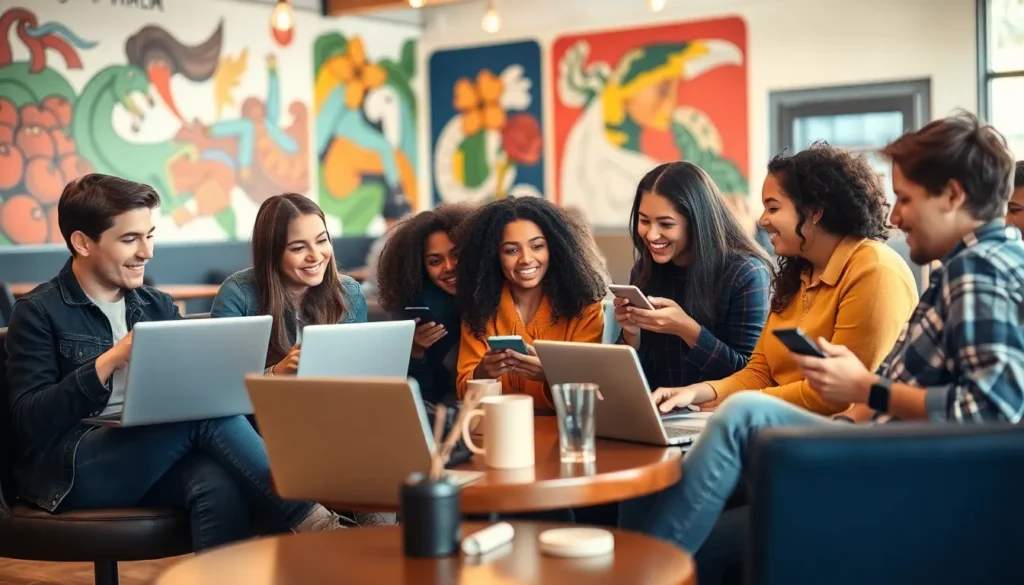In today’s fast-paced world, digital culture isn’t just a trend; it’s a way of life. From memes that spread faster than wildfire to TikTok dances that can ignite a global craze, it’s clear that the digital realm shapes how people connect, create, and consume. But let’s face it, navigating this virtual jungle can feel like trying to find Wi-Fi in a coffee shop—frustrating yet essential.
Table of Contents
ToggleOverview of Digital Culture
Digital culture significantly influences various aspects of daily life. It shapes how individuals connect and communicate. Social media platforms, such as Facebook and Instagram, serve as primary venues for interaction. Users share personal updates, opinions, and entertainment, creating a vibrant online community.
Creativity flourishes within this digital space. Content creators leverage tools like video editing software and graphic design applications to produce engaging materials. This innovation fuels trends, including viral memes and dance challenges, which often reach global audiences almost instantly.
Consumption patterns also evolve rapidly due to digital culture. E-commerce platforms enable shoppers to access a vast array of products and services from their homes. Streaming services allow users to enjoy movies, music, and television shows with just a click, changing how entertainment is experienced.
Navigating this digital landscape poses challenges. Users encounter issues like misinformation and digital fatigue, which may affect their experience online. Crafting a balanced digital diet becomes essential for mental well-being.
Fostering critical thinking helps individuals discern credible information from unreliable sources. Engaging in digital literacy promotes responsible content creation and consumption. By understanding the implications of digital culture, individuals can harness its benefits while mitigating its challenges.
The dynamic nature of digital culture continues to reshape society. As technology progresses, new trends and behaviors will emerge, influencing connections and creativity. Adapting to this evolving landscape remains crucial for individuals and communities alike.
Key Components of Digital Culture

Digital culture includes various elements that shape interaction in today’s society. Each component contributes to how individuals communicate, express themselves, and connect with technology.
Technology and Communication
Technology transforms communication methods significantly. Instant messaging apps allow conversations in real time, reducing barriers. Video calls create immersive experiences that mimic face-to-face interactions. Accessibility to information enhances collaboration among teams, making it easier to share ideas. Virtual reality introduces new dimensions of engagement, allowing people to connect on different levels. Frequent updates in technology lead to evolving communication tools, ensuring users remain connected globally.
Social Media Influence
Social media platforms play a crucial role in shaping public discourse. Facebook and Instagram serve as primary venues for sharing ideas and connecting with friends. Viral trends spread swiftly, showcasing creativity and fostering participation. User-generated content influences popular culture, bridging gaps between audiences and creators. Social media facilitates awareness around social issues, encouraging activism through online movements. Continuous interaction fosters community building, creating spaces for diverse opinions and discussions.
Digital Identity and Self-Expression
Digital identity reflects how individuals present themselves online. Social media profiles showcase values, interests, and personal stories. Content creation offers avenues for self-expression, allowing users to share experiences creatively. Different platforms encourage varied forms of expression, from aesthetic photos to microblogging. Anonymity provides freedom for individuals to explore their identities without fear of judgment. Online identities also impact real-life perceptions, shaping how individuals engage with each other.
The Impact of Digital Culture
Digital culture influences various aspects of daily life, impacting society and the economy significantly.
On Society
Digital culture reshapes societal interactions. It transforms communication patterns, enabling people to connect in real time. Individuals engage more frequently with one another through social media platforms. Online spaces foster communities based on shared interests, promoting inclusivity. The nature of friendships evolves as virtual connections gain importance. Furthermore, social movements gain traction online, amplifying voices and driving social change. This shift allows marginalized groups to unite and advocate for equality. Despite these positives, society remains challenged by issues like misinformation and digital fatigue. A balanced digital experience becomes essential for mental health and well-being.
On Business and Economy
Businesses adapt quickly to the changes driven by digital culture. E-commerce rapidly grows, allowing consumers to shop from anywhere at any time. Traditional retail businesses face pressure to innovate or risk falling behind. Technology enhances marketing strategies, as companies leverage social media and data analytics. Instant feedback from consumers aids in refining products and services continuously. The gig economy flourishes, offering flexible work opportunities. Individuals today prioritize experiences over possessions, influencing consumption patterns. As a result, businesses must embrace agility and adaptability to thrive in this dynamic landscape.
Challenges and Criticisms of Digital Culture
Digital culture presents several challenges and criticisms that warrant scrutiny.
Privacy Concerns
Privacy concerns emerge as a significant challenge in the digital landscape. Data breaches and unauthorized data collection pose risks to individuals’ personal information. Users often unknowingly share sensitive details on social media platforms. Companies frequently track online behavior for targeted advertising, raising ethical questions about consent. With legislation like the General Data Protection Regulation (GDPR) in Europe, the push for stricter data protection emphasizes the importance of individual privacy rights. Awareness about how data is utilized can empower users to make informed choices regarding their online presence.
Digital Divide
The digital divide remains a critical issue within digital culture. Access to technology and the internet drastically varies across demographic groups, affecting educational and economic opportunities. Rural areas often experience slower internet speeds compared to urban centers, leading to disparities in access to information. Socioeconomic factors also contribute, as low-income households may lack the necessary devices for effective participation in a digital society. Bridging this gap is essential for promoting equity, ensuring everyone experiences the benefits of digital culture. Schools and community programs promoting digital literacy can play a vital role in this effort.
Future of Digital Culture
Emerging technologies will shape the evolution of digital culture in the coming years. Artificial intelligence (AI) increasingly influences content creation, personalizing experiences based on user preferences. Users may find themselves engaging with interactive storytelling, where narratives adapt to individual choices.
Virtual reality (VR) and augmented reality (AR) create immersive experiences that redefine entertainment and interaction. Media consumption might evolve, transitioning from passive viewing to active participation in shared experiences. Communities of creators could flourish, using these technologies to foster deeper connections with audiences.
Social media platforms are likely to continue driving cultural trends, but shifts in user behavior may lead to the rise of new platforms catering to niche interests. Content sharing may prioritize authenticity and transparency, decreasing the prevalence of heavily edited posts. Influencers might adapt their strategies, using genuine interactions to cultivate trust with followers.
As remote work becomes commonplace, digital culture will further influence professional environments. Companies could prioritize flexibility and collaboration, utilizing digital tools for effective communication. The gig economy may expand, empowering freelancers to utilize platforms for diverse opportunities.
Digital literacy remains crucial as the landscape evolves. Educational initiatives will focus on equipping individuals with skills to navigate this changing environment. Addressing the digital divide requires investment in access and education, ensuring equitable opportunities across communities.
Overall, the future of digital culture will balance innovation with responsibility. Societal impacts, from activism to artistic expression, will reflect the values of interconnectedness and creativity. Everyone will play a part in shaping this dynamic landscape as digital culture continues to transform everyday life.
Digital culture is a powerful force shaping how individuals connect and interact in today’s world. It fosters creativity and innovation while transforming consumption patterns and communication methods. As technology continues to evolve, so will the dynamics of digital culture, requiring adaptability from both individuals and businesses.
While the benefits are significant, challenges like misinformation and privacy concerns must be addressed. The future will demand a balance between embracing technological advancements and ensuring responsible usage. By prioritizing digital literacy and equity, society can navigate this complex landscape and harness the full potential of digital culture for positive change.

